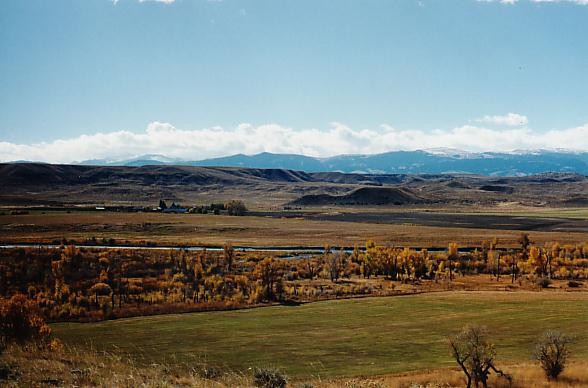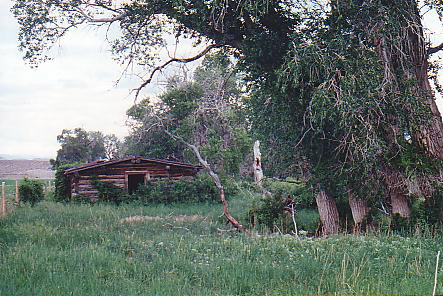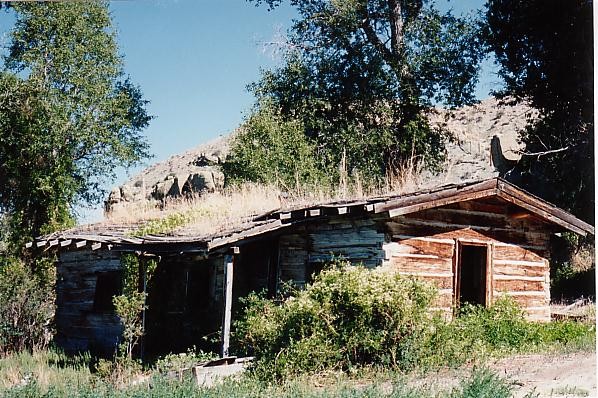
The Selling Of The Winchester Ranch
Winchester
Draw, that's all that's left of her,
though few would know.
Once a name inscribed on the bridge,
identity stamped on a rail,
passers-by heard echos of the Old West—
lever action, legend, Winchester!
A new road crosses on a big steel culvert now,
no place to hang a sign.
The
new name on the ranch mail box shrouds
five generations, gone.
Time and space are severed,
scattered,
reduced to history—
"Winchester!"
I hear them say,
"the old Winchester place,"
an epitaph, a transmigrated soul.
The Winchester Ranch,
shaped by calloused hands, a name
on soil and sod, field and fence,
ditch and draw,
somewhere to come to, be someplace again.
Sold!
Winchester Draw,
carved hard by melted snow and rain—
the weathered lines of long-days toil
etched in Jack's and Albert's face—
I find it on a map, trace it with my finger
up the foothills of the Winds, down again,
slithering like a Bull Snake to the ranch—
its head cut off.
Fall Cattle Drive
Reddish-brown
white-faced Hereford cattle
low in my interior range, bearing Lazy-Three H,
and Walking K-Bar brands, trailing down the
Wind from high Absaroka pastures.
Drovers shout, whirl their lariats, spur their
horses toward reluctant cows; a bull whip cracks
to move the herd, while curved-horned bulls
bellow, pawing dust, raging, rake-ripping
sage brush, warning rivals, I'm the boss bull.
Names of cowhands shine like lights in past-time's
hallowed shrine, stand in bold relief like place
names on a map: Jack Gavin, Bob Westman,
Jack Hornecker, Gussy and Einar Anderson,
Jake Shongutsie, Marvin Thompson, following
their bliss on cattle drives, coffee around a crackling
fire, sleeping on the hard, bare ground—the glory days.
Trailed
down to the lower ranch, grass-fat steers,
cut out, corralled, peer through lodge pole rails,
unaware another trail's ahead on railroad cars
to distant stockyards—turned to cash in Omaha.
Broad
bare fields face an open sky,
hay, harvested, heaped,
in sculptured stacks stand sentry
waiting winter's white invasion.
Cattle
glean the last of pastures,
crowd the temporary fence that keeps
them from the sweet alfalfa stacks.
Soon the move to calving grounds,
the shelter of the timber and high sage.
Horses
blowing steam billows
reveling in the sting of steel sharp air,
dark clouds, streaked gray manes
sweeping down high mountains
toss their heads and snort,
gallop high-tailed, tearing along
barbed barrier fences, harbinger
impending storms.
Snow
fields sparkle bright winter sun;
hay stacks, white capped, shiver men
forking down beneath the frost, until
hot blood pumped through steel cold
muscle vents hard breathed boiler steam,
rising, crystalized to ice on grizzled beards.
Heaped
high hay racks roll on wheels,
frozen stiff rubber tires squeaking snow,
complaining of the cold, not content to
bear the load in silence. Farmall tractor's,
muffled sounds, swell out to the herd,
where each fork-full, filed way, is pitched
to hungry cows, crowding, trailing,
trampling, fouling food, inept at etiquette,
destitute of gratitude for those who
hard-labored, bring their daily bread.
Sheepskin Coat
On
a porch wall peg hung
Old Jack's sheep-skin coat,
leather scuffed from scraping
trees and hooking brush, a
dozen shades of earth driven
in and set by wind and every
word for snow.
After
Old Jack died, or rather,
after Jack was horse-killed,
the coat was left to hang there
waiting for a hand to heavy-lift
it off its peg and put it on.
Everybody with a first-come need
wore it during cut-to-the-bone weather.
Old
Jack walked outside again,
each time someone went to
cold-hands milk the cow, or fetch
snow buried wood to build a fire.
The
old coat reminisced us;
Jack, riding winter-horseback,
or pitchfork planted, standing on
the hay rack, that heavy skin,
collar up against the wind.
Wafted
smells of coffee brewing on the stove
brought the clan together near first light.
Everyone together fed on oatmeal first,
honey-drenched, flooded with thick cream,
then moved to stacks of pancakes, churned-
butter slathered, and topped with Karo syrup,
along with bacon, eggs, sometimes steak,
washed down with hot black coffee, or for kids,
fresh whole milk–not a fat one in the litter.
Supper, as with dinner, serving steaming
plates of meat with boiled spuds, fresh-baked
bread, and butter. Hazel and my mother waited
table, Albert tallied, took stock, surveyed,
each one, hand, or handout, child or kin;
spun a tale to make the children laugh,
feel content, happy they're related,
happy we're their friends.
Winchester
kids and kin-kids, flaunting white-hay hair,
mounted flame red Farmalls at haying time: "A's," "C's,"
"H's," and "M's," to mow, rake, buckrake, and drive
the stacker,
until the job was done, and fields lay green-alfalfa crowned,
better groomed than stacks of wind blown white-hay hair.
Across
the river, brood cows calve on February nights
while coyotes scavenge afterbirth.
Drawn by instincts sown in hunters since the dawn of time,
my father took me with a string of traps,
a stalker with a lethal touch, sharing a primeval blood,
enjoining rites of life by death.
Across
the river, light snow clings to sage
taller than a man can reach, beneath a register of tracks
imprinted with an absence of intent,
but transformed into story by a knowing trappers eye:
A rabbit dangling off in open space
with wing tip marks and tail print of a silent Great Horned Owl;
further on in dense brush Bobcat tracks half filled with snow,
and bits of scattered rabbit fur tell of ambush in the night
while snow still fell.
In an open field, a coyote's stealth, one paw raised before
the measured pounce, one drop of telling blood,
a period to a field mouse foraging.
Across
the river, raucous Magpies in the brush
guide us to a carcass of a deer, bare ribbed and gnawed,
a place for coyote traps placed with skill by one who studied
creatures of the wild until their ways and his were one.
He studies the approach, hollows out a place in frozen ground,
hammers in a long steel stake, depresses springs, opens jaws,
lifts the pan, groves the dog.
Shredded bark and leaves conceal the set, while cold steel
waits with patience for the feel of pressure on the pan.
Across
the river, Blue Winged Teals disturbed by our appearance
rise at waters edge, escape upstream to meet the Peregrine,
prince of ariel death, a feathered lightning bolt;
it strikes it prey and guides it to the earth on sinewed wings.
Humbled man, exhilarated, stands in awe at such design.
Across
the river, in a tangled root washed bare by last spring's floods,
a mink has dined on muskrat taken in a trap we meant for it,
then further on we find him hanging in a snare.
No pretense of justice here, its pelt worth twenty muskrats.
Across
the river, the slightest motion caught at timber's edge
betrays a coyote hunting in the tall dead grass,
too intense for caution.
I seek a rest, take aim, the rifle cracks a lesson from the wild:
when caution wanes death strikes from behind, above, beneath,
from far away, close by, from ambush.
The talon, fang, and claw, and me, across the river.
The Beginnings and Endings


On the left is the first dream cabin Albert Winchester built for his bride Hazel. It is slowly sinking into the ground. On the right is the old Nations cabin built from logs taken from the older and bigger Stagner ranch house. The Stagners were breed Shoshones who ranched here during the early part of the 20th century. Old Jack was the patriarch of the Winchister family, who first worked for the Stagners before striking out on his own across the river. The Winchesters eventually bought all this property and the Schmoyer place further down the river, and incorporated it into the Winchester Ranch.
When they sold out
and loaded up the truck
to leave this homestead,
this house
now falling in and falling out,
I could not have known
fifty years hence
I'd stand here
amidst the ruined vacancy,
aggrieved that time
exacted such a heavy toll,
my body bearing witness.
My unyielding will
would conquer my estate,
turn back the clock;
yet I share the weakening of these walls,
await the crumbling;
we are one with destiny.
Let me rot away amidst good company,
among the dwellings where I shelter took,
the tables where I shared the bread of friends.
Let our dust of hill and home, of flesh and bone,
together blown,
settle here to sprout like seed
on this sweet prairie.